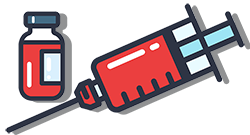Free Shingles Vaccinations

From 1 November 2023, the shingles vaccine Shingrix® will replace Zostavax® under the National Immunisation Program (NIP).
Who is eligible for free shingles vaccine?
- Aboriginal adults aged 50 years and over
- adults aged 65 years of age and over
- haemopoietic stem cell transplant
- solid organ transplant
- haematological malignancy
- advanced or untreated HIV
Everyone six months and older is recommended to get an influenza (flu) vaccine each year. The flu vaccine not only protects you, but it also can help protect those around you.
Vaccination after Zostavax® or an episode of shingles
Patients who have previously received Zostavax® free under the NIP cannot receive free Shingrix® until at least 5 years after the Zostavax® dose.
Patients who have previously received Zostavax® privately, are eligible to receive Shingrix® free under the NIP. An interval of at least 12 months is recommended between receiving Zostavax® and a subsequent dose of Shingrix®. The person will still need to complete the 2-dose schedule of Shingrix®.
People who have had shingles/herpes zoster previously are still at risk of future episodes. Immunocompetent people should delay Shingrix® for at least 12 months after an episode of shingles. Immunocompromised people are at higher risk of recurrence. They can receive Shingrix® from 3 months after the acute illness, following an individualised risk-benefit discussion on the ideal interval for vaccination.


Co-administration with other vaccines
People can receive Shingrix® at the same time as other inactivated vaccines such as tetanus-containing vaccines, pneumococcal vaccines, influenza vaccines and COVID-19 vaccines. However, it is preferable that Shingrix® be given by itself where possible as there is potential for increased adverse events when more than one vaccine is given at the same time.
Co-administration with other vaccines
Who needs a flu vaccination?
Everyone six months and older is recommended to get an influenza (flu) vaccine each year. The flu vaccine not only protects you, but it also can help protect those around you.
The following groups of patients are eligible to receive free government-funded flu vaccinations:
- individuals aged 65 years or older
- children aged 6 months to students in year 6
- pregnant women (any trimester)
- Aboriginal people 6 months and older
- chronic respiratory conditions
- cardiac disease
- chronic neurological conditions
- impaired immunity
- diabetes and other metabolic disorders
- renal disease
- haematological disorders
- children aged 6 months to 10 years receiving long-term aspirin therapy.
Don't forget to wash your hands...
The Australian Immunisation Register
Your immunisation provider is required to report all influenza vaccinations to the Register. This includes some personal information such as your name, date of birth, contact details, and your Medicare card number.

